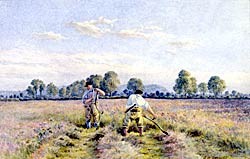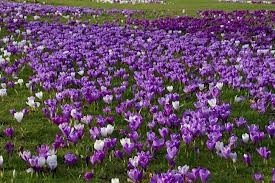Crocus time in the Meadows - a lament

The Meadows in the 19th Century
Oscroft

Crocuses
As described by J.B. Firth in "The Highways & Byeways of Nottinghamshire" (1915)
Firth begins with a description of how the Meadows area of Nottingham used to look in days of yore by quoting from the book Walks Around Nottingham by 'The Wanderer', written in 1834:-
"How delightful it is, when wearied with the bustle and the noise of business, to escape from the narrow streets filled almost to suffocation and to spring over the bridge near the Navigation Inn , bursting at once upon Nature, arrayed in her richest verdure ! "
If, says Firth, The Wanderer were to spring over the same bridge to-day he would burst not upon Nature but upon a particularly dismal street along which the trams run to Wilford Bridge .
The Meadows ! The whole three hundred acres which stretched from the Leen down towards the Trent were once real meadows, famous for their floods in winter and in the spring for their crocuses. They formed part of the wide belt of commonable land round Nottingham , wherein each burgess might keep three head of cattle from July 6 to August 13, and again from October 3 to Candlemas, while at other portions of the year it was allotted for the use of aged burgesses or their widows.
So it remained until 1845, when the railways (the first train ran from Nottingham in 1839) required land for extension, and the town wanted space in which to expand, and so by Act of Parliament the burgess rights were bought out and extinguished.
It is no use lamenting the loss of the Meadows ; that was inevitable sooner or later.... Nottingham folks used to go "crocusing" in spring as they went blackberrying in September. There was no need to search for the flower. The whole Meadows were ablaze with fairy gold, and in proof thereof may be quoted a pleasant little poem, written by Mrs. Ann Gilbert, a lady much better known to those of an earlier generation by the name of Ann Taylor. actors. The poem is called, " The Last Dying Speech of the Crocuses " :
Ye tender-hearted gentlefolk of Nottingham 's fair town
And ye who long have loved us from the poet to the clown,
Attend our sore complainings, while with one accord we weep,
From mossy beds uprising, where we sought our summer sleep.
How many a pleasant spring-tide, ere a blossom peeped of May,
Nor yet a stealthy violet its dwelling did betray,
And scarce the winter flood had left the lowlands to the sky,
We came in thronging multitudes to gladden every eye.
We came a simple people in our little hoods of blue,
And a blush of living purple o'er earth's green bosom threw,
All faces smiled a welcome, as they gaily passed along,
And, " Have you seen the Crocuses ? " was everybody's song.
Forth came the happy children to their revel in the flowers,
Forth came the weary working-man to that sweet show of ours,
Forth came the lace-girl cheerily the common joy to share,
And e'en the stately gentle-folks were pleased to see us there.
But oh ! twas dreary midnight when we heard the winds bewail,
Deep strange Eolian whisperings came sighing on the gale,
Anon with hammer, wheel and blast the welkin rang around,
And each a deadly shiver felt beneath us on the ground.
Awakened in the solemn gloom of that untimely hour,
The little spectre darted up of each ill-omened flower,
While o'er its head a coming spring in brick-red trance was seen,
As factory, mill and wharf besoiled our home of meadow green.
One gentle shriek the silence broke, one quiver of despair,
" Our fatherland, farewell ! " we cried, " Farewell, ye meadows fair ! "
" Dear children born of yester-spring dear children, yet to be
Ye shall but read of Crocuses no more alas ! to see."
" Spirit of giant trade ! we go ; on wings of night we fly,
Some far sequestered spot to seek, where Iqpm may never ply,
Come line and rule come board and brick all dismal things in one
Dread Spirit of Inclosure come thy wretched will be done ! "